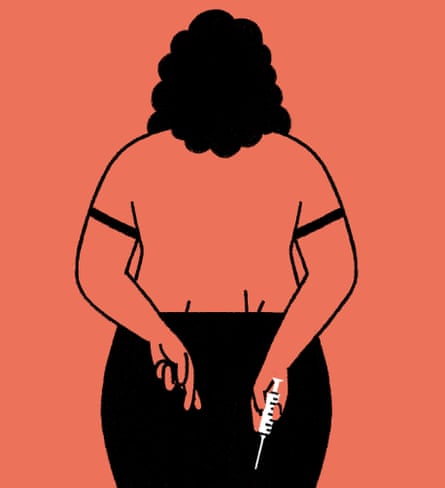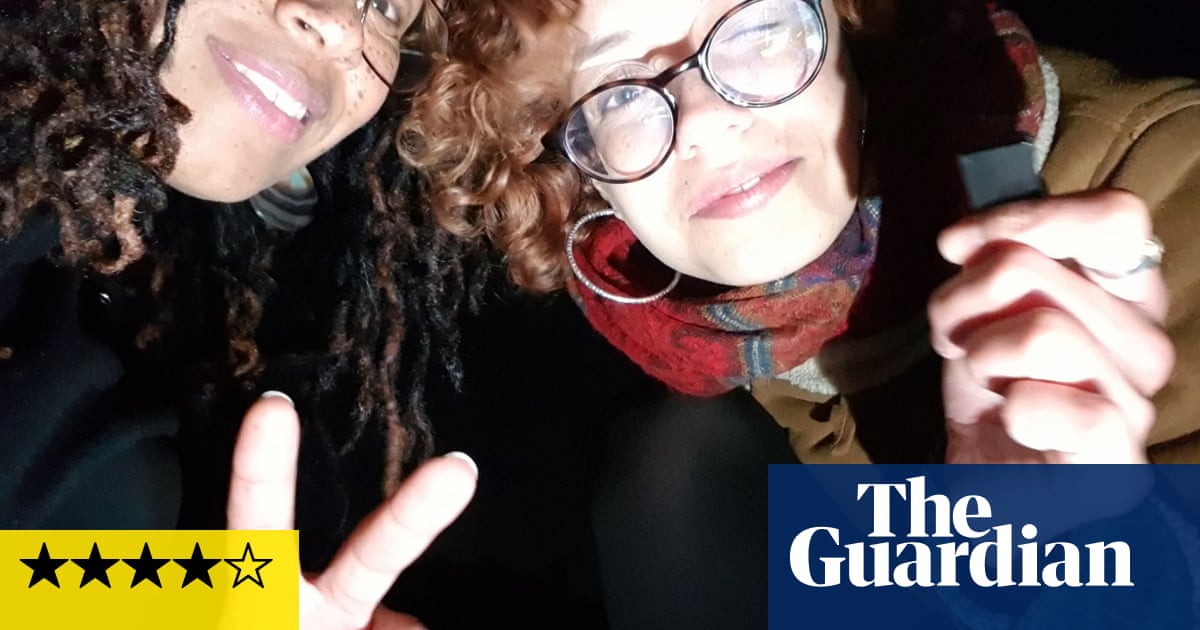Every Friday night, Claire, a 50-year-old woman in Berkshire, waits until her husband and son have gone to bed. When she is sure the house is quiet, she tiptoes out to her garage, and over to a tin tucked away in the corner. It is chilly out there, but she doesn’t mind; that’s the point. Inside the tin, away from the prying eyes of her family, is a vial of the GLP-1 medication Mounjaro, which needs to be kept at about 8C. Claire has been taking it without them knowing for several months. “It would have been harder to get away with in summer,” she says.
As weight-loss medications have become more and more popular, lots of people in the public eye have been dramatically changing shape, walking the red carpets or hosting TV shows in bodies half the size they once were. But as the jabs have become cheaper and more readily available, so, too, have ordinary people been disappearing before our eyes. And many are choosing not to disclose just how this weight loss is happening. Like Claire, these “secret jabbers” are keeping it private even from their closest family and friends.
All over social media, accounts and posts are cropping up focusing on the experience of being on GLP-1 injections (the clinical name for weight-loss drugs such as Ozempic, Mounjaro and Wegovy), but keeping it hidden. There are Reddit sub-chats where secret jabbers share their tips, such as where to stash the medication to keep up the ruse and also keep it cool. People describe hiding it inside a mascara box in their makeup fridge, in a wine cooler, at the back of the salad drawer, inside a bottle of a protein drink they know no one else in their family is interested in trying. Users also share the lies they have told to disguise being on the medication – new gym routines, a dislike for dessert – and bond over the complications that arise from their nearest and dearest not knowing why they’re suddenly dropping weight. “My husband started to think I was terminally ill,” one TikTok commenter confesses.
Why are people so keen to hide their weight-loss medication? Why go to such lengths to keep something so seemingly inconsequential so private? I talked to some secret jabbers, in strictest anonymity, to find out what’s behind their choice to keep stumm.
Claire started to notice a few years ago that her weight was making it more and more difficult for her to move around. When she decided to start GLP-1 injections, she told her osteopath and a small handful of close friends, but not her husband. “It wasn’t fear of his reaction,” she says, “but I’m an extremely private person when it comes to my thought processes. And for me, this one ran really deep.”
She got her jabs from a private online pharmacy. In the early weeks, the tin in the garage was good enough cover for her secret. But it eventually became untenable to keep her medication under wraps because Claire’s husband does most of their cooking. “I haven’t been hungry since mid-November,” she says, “so my husband was cooking the same stuff and I was starting to struggle to eat it. I got away with it for about six weeks with comments like, ‘Yeah, I’m not very hungry tonight’, so he started to serve up a bit less. But even then I was leaving half a meal, which was already two-thirds of the size of what he’d been serving me before.” It was the food waste that got to him, Claire says. “He was quite frustrated. He said, ‘I don’t know what you’re doing. You seem to be trying to eat less or something.’ And there was no getting around it once it was obvious.” She decided to come clean. “I was like, well, since you ask, I have been on this weight-loss medication for the last month and a half … ”
He took it well. “He was surprised, I think, and bemused. Ultimately, the words that came out were, ‘Oh, well, that makes sense. Why didn’t you tell me?’ Once it was out there, it was a non-event.”
Eliza, also 50, has been on Mounjaro for seven months. She lives in North Yorkshire, works for a large charity and has a beloved cat who walks across her keyboard while we chat. She’s had a hard few years. Her brother and her mum both died, and grief on top of menopause meant that she went from always feeling as if she was a little heavier than she would like to a more sustained kind of weight gain. Initially, she didn’t tell anybody she was going on GLP-1s, although she has recently confided in one friend also taking Mounjaro. Neither of them have told their husbands. “I was at their house having dinner recently and her husband was like, ‘Oh, you ladies are looking very slim.’ I’m finding it slightly problematic now,” she admits.
Eliza thought her husband probably wouldn’t understand why she wanted to go down the GLP-1 route, because he’s such an “eat less and move around more kind of guy”. She doesn’t actively hide the medication from him, though; she just keeps it in the fridge and knows he won’t notice. “It’s amazing how unobservant people are,” she says. This isn’t the first time she has hidden a weight-loss management attempt from her husband. “I went to Turkey and had a gastric balloon, and I didn’t tell anyone, not even him,” she says. “I just pretended that I was going to London for a meeting and then popped off to Turkey. It’s actually quite wild,” she says, almost surprised at herself. The gastric balloon didn’t work, so she turned to weight-loss injections. She gets them from an online pharmacy, for £160 a month.

Moira, 55, in the Cotswolds, started taking Mounjaro in October and also hasn’t told anybody, including her husband. “Over the past few years, I’ve gone through lots of different treatments, with menopause, HRT and patches and stuff, so he’s used to seeing things come into the house but not really asking many questions,” she says. He and her mum have both commented on her new shape. “They’ve noticed, but they’ve not really put two and three together to make four or five or seven,” as she puts it. “Now I’ve got to this point, I can’t really come clean,” she says. Moira has lost 10kg (22lb).
Cameron, a retired opera enthusiast in central London, is single, but made a decision early on in his GLP-1 journey that he wouldn’t be telling his closest friend, or his parents. “Even as a 58-year-old man, my parents’ opinion matters, because it makes life easier if they’re not being ignorant, judgmental and shortsighted,” he says. He worries that they’d say it’s dangerous, or “they would be judgmentally dismissive. They’d be like, ‘Well, you’re not doing it properly.’”
This idea of “doing it properly” is a pervasive one. For decades, people have had the idea that weight loss must involve hard work: consistent, difficult exercise and sacrificing pleasures such as delicious meals. The willpower involved is seen as admirable; the idea – which has been debunked by research into obesity – is that anyone can have a slim body, if they only try hard enough. By contrast, using injections to lose weight is perceived as easy, even “lazy”, and unworthy of the praise that gets lavished on people who are seen to have changed their bodies through sacrifice alone. Perhaps this is why people are keeping their jabs to themselves.
Cameron doesn’t lie about it per se, but he’s come close. He is using Mounjaro, rather than the similarly popular Wegovy. “My sister-in-law asked me. She said, ‘You’re not taking Wegovy, are you?’ And I said, ‘No, I wouldn’t even consider it.’ Because I’m not, and I wouldn’t. If she had asked me the right question, I would have said, ‘Absolutely I am’ but I only have to answer the question she asked,” he says with a wry smile.
Gail Bohin, a clinical psychologist for the NHS’s specialist weight management service in Gloucestershire, says this idea that people on GLP-1s are “cheating” is widespread. “It’s all tied up with a bigger picture of living in a weight stigmatising culture, because people are seen as personally responsible for gaining weight, and then the association of that is: it’s your fault that you became diabetic, or that your joints are playing up. People use phrases such as ‘soft options’ or ‘easy get-out’ about GLP-1s, which just shows the underlying attitude that it is completely within your control to fix this and you should just try harder.”
“At the end of the day, I have dieted,” Jasmine says. “I’m just not getting that interference of being hungry all the time.” In her mid-60s, she has been on Mounjaro for almost a year and kept it secret from everybody except her husband, despite significant visible weight loss. “You can’t lose this much weight without people wanting to know what you’ve been doing,” she says. No one has asked her outright if she’s on GLP-1s, and she’s not sure what she’d say if they did. “I would have problems lying,” she says. “I could do it if I was on The Traitors, but that’s a game and this is my life.” So far, she’s been saying that she’s radically changed her diet – but not that GLP-1s are the reason.
Secret-jabbers all fear judgment, and other people’s opinions colouring their own view of whether the drug suits their needs. “I come from a family who are very opinionated,” Moira says. “My husband and mum can be critical without realising, and that can prevent you from making good choices about changing your life.”
Paulo is in his 30s, in a job that brings him into contact with the fashion world, where GLP-1 is a hot topic these days. He has been on Wegovy for six months and decided early on that he wanted to tell as many people as possible what he was doing. “I almost want to get it out of the way before someone says something mean about it. Like, ‘Oh God, how lazy are people who take Ozempic?’ I’ve already had someone refuse to talk to me, because he says he was so disappointed that I was taking it.”
It’s reactions like this that made Jasmine want to keep her Mounjaro use a secret. She stayed with some family friends recently, one of whom had been taking Ozempic. “Everyone was being quite derogatory about the fact that she had resorted to medication to help her lose weight,” she says. “Behind her back they would say she shouldn’t really be taking it. Yet to her face, everyone was saying, ‘Oh wow, you look fab.’ So I began to pick up on the fact that there was this duality in how people responded to you when you were taking it.”
This word “resort” comes up again and again. There is an element of shame for some people, embarrassment that they have had to somehow stoop to taking medication for weight loss instead of achieving it by “natural” means such as exercise and dieting. If not ashamed about the drug itself, some users feel ashamed about being overweight in the first place. “I think: why can’t my willpower do it?” Jasmine says. “But then I know that I’ve been using willpower and it hasn’t worked.”
For Eliza, it’s not shame about the jab. “I feel ashamed about being fat,” she says. “Because that is the literal point of fat shaming: that if you don’t look like Naomi Campbell, you are some kind of bad person. So I told nobody.” But as she has visibly lost more weight, she has found the “web expanding”, as she puts it, of people she is having to deceive about the reason. Over Christmas, her husband asked her outright whether she was using weight-loss injections and she told him no. “Now, all of a sudden, people are definitely noticing, so that has been very awkward and difficult, because I just didn’t know what to say. I’ve been kind of fudging it.”
The dominant cultural narrative seems to be that we want people with bigger bodies to suffer in some way if they want to lose weight, Paulo says. “Society hates fat people so much that there is this real belief that they should be punished in the process of shedding their weight. Like, you should be in the gym every day sweating away and kind of crying the fat off.” He thinks there is something of a cultural panic going on about Ozempic, because it has allowed some significantly overweight people to choose to lose that weight without “hard work”.
“We view people who are overweight as having failed at something,” Claire says, “that if only they’d been a little bit stronger their whole life, they’d be able to overcome it.”
Dr Julia Mueller, a researcher at the University of Cambridge who specialises in the psychosocial determinants of obesity and weight management, tells me she’s “really saddened” to hear that people feel they need to keep their injections secret. “But not at all surprised. The narrative around these weight-loss medications, on social media, in general media, even from some healthcare professionals, has often been very stigmatising: that it’s an easy way out, a quick fix.” She worries that the secrecy puts an extra psychological pressure on those trying to lose weight: “I think anyone who’s ever kept a secret, especially from someone they’re close to, knows it’s difficult and requires effort.”
The secret jabbers tell me they’re happy on the drugs, and about the life-changing difference it has made thus far. People speak about their lifelong inability to turn off the voice in their head, often referred to as “food noise”, that was constantly asking what they would eat next and whether it would be OK to eat it. GLP-1s, everyone says, have finally turned off that voice. “It’s one of the biggest ironies there is in the whole weight and diet industry,” Jasmine says. “I’m a veteran of Slimming World and Weight Watchers, and all you do is think about food. What can I cook? How can I prepare this food? When you go shopping, you’re constantly looking at labels. And the one thing you want to do is to stop thinking about food.”
Paulo didn’t come to weight-loss drugs lightly; he decided to look into Wegovy after he had a fall. “A proper fall, like people in their 80s fall. But I was 30. I couldn’t sustain my weight coming out of a car and I fell on to the road. I thought: this is getting out of hand.” He was then diagnosed with pre-diabetes. Since being on Wegovy, he has done a cardiovascular test which showed that his risk of heart failure has more than halved.
Cameron tells a similar story. “I don’t feel out of breath walking up and down two flights of stairs. It used to be I would walk five minutes, I’d be soaked through. That’s not the case now. All of my bloods are better, my liver function is better, my body fat is down.”
Two of the people I speak to use the analogy of quitting smoking to counter the idea that taking a drug to help lose weight for medical reasons is in some way a cop-out. “We would never berate anyone for giving up smoking, but do we call it cheating if they use nicotine tabs?” Claire says. “For me, it’s a direct parallel.”
Perhaps it’s no surprise that people choose to keep their use of GLP-1 medication secret, given the sensitivity of weight as a subject. It should be none of our business whether someone else chooses to take weight loss medication or doesn’t, exercises or doesn’t, eats more or less, weighs more or less. It should be a personal choice made for personal reasons, subject to no judgment from anybody else. We don’t live in that world, unfortunately, and so the secret jabbers find themselves stuck: damned if they do, and damned if they don’t. As Jasmine puts it, “You may deride someone for being overweight, but when they take a medication to resolve that issue, you deride them for doing something about it.”
Some details have been changed.

.png) 18 hours ago
6
18 hours ago
6













































